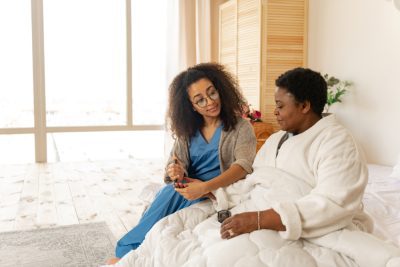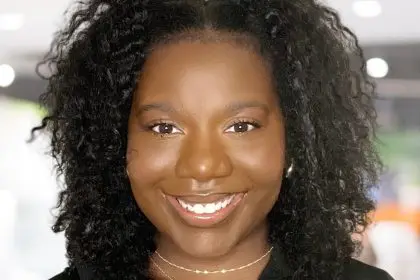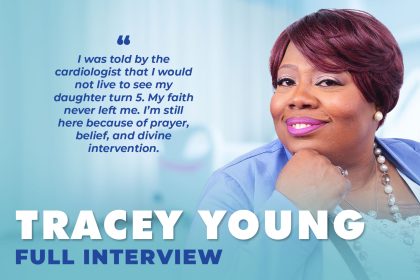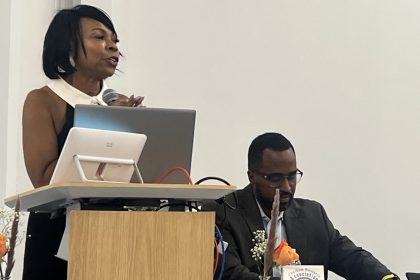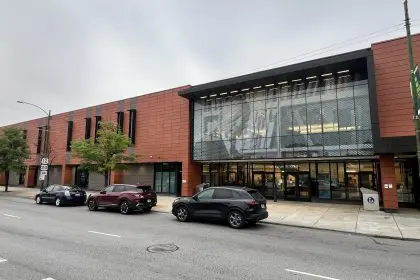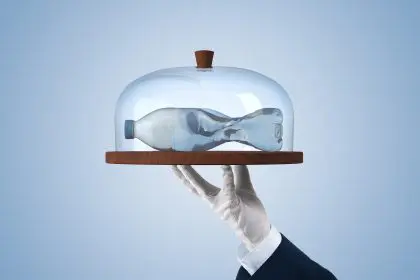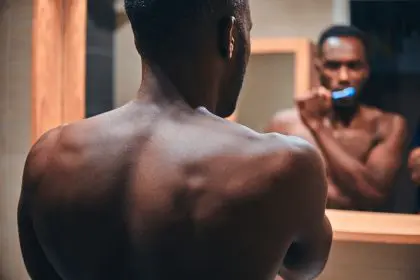Linda Goler Blount, MPH, is an epidemiologist and president of the Black Women’s Health Imperative, the first national non-profit organization focused on Black women’s health and wellness. Blount has overseen more than $30M invested in research to prevent chronic disease and HIV, ensure reproductive justice and healthy maternal outcomes, and advocate for health-promoting policies. She is also the executive chair of the Rare Disease Diversity Coalition, a $20M collaborative of over 80 organizations formed to ensure patients of color, low-income, and rural patients are centered in research, advocacy, and policy.
Her career includes leadership tenures at the Centers for Disease Control and Prevention, the Coca-Cola Company, and the American Cancer Society. She also has extensive international health expertise and has served as a consultant to government ministries in Germany, South Africa, Zimbabwe, Malawi, Jamaica, and Trinidad and Tobago, where she lived for four years. A Michigan native, Linda holds a master of public health degree in epidemiology from the University of Michigan and a bachelor of science in computer engineering/operations research from Eastern Michigan University.
She spoke with rolling out publisher and CEO Munson Steed about empowering Black women.
[Editor’s note: This is an extended transcription. Some errors may occur.]
Munson Steed: Hey, everybody! This is Munson Steed and welcome to another edition of Health IQ. This is definitely one of my favorite days when I think of individuals who dedicated every moment that I’ve seen, that have made progress for women in general, but Black women in particular, an organization that has established itself as truly a problem solver in the lives of all Black women and making it so that there is no both technology, service, compassion and literally a level of empathy, as it relates to all those things that besiege Black women, that is no results of their own, and reducing the distance between health, knowledge, exercise, coaching.
Even providing the love necessary for us to heal as a community, Linda Blount, the only CEO in her own right. Everybody! How are you?
Linda Goler Blount: I’m fine, Munson. It’s so wonderful to be here. Thank you. I cannot wait to spend some time chatting with you. This is really exciting.
MS: Well, thank you for that. But you really have, if you’ll share with the audience the name of the organization, and really your mission, as it relates to obviously just getting a pathway to great health on top of anything else that you’d like to share with us.
LB: Well, thank you. So, the organization it’s the Black Women’s Health Imperative, and I have the privilege of being able to lead this organization, and have been so for 10 years. The organization itself is 40 years old. We just celebrated our 40th anniversary last year and, Munson, for 40 years, there’s been exactly one national organization focused on the health and wellness of Black women, and that’s us. And we take it very seriously. So, we’re focused on the issues and the health conditions that most affect Black women and that are responsible for most of the avoidable mortality.
The avoidable deaths that we experience: chronic disease, diabetes, heart disease, obesity-related syndromes, but also maternal health issues, reproductive health. We were founded as a reproductive justice organization, and so we take that very seriously. We talk about HIV prevention. But all of this work is undergirded by policy, because we know as much as we talk about advocacy and giving Black women the information they need. If we don’t change systems and policy, we won’t be able to actually change much about our health outcomes, and policy requires something else, which is what I have brought to the Black Women’s Health Imperative, and that is an emphasis on science and research and data.
So, we’re able to take the science, we’re able to conduct research, bring data to policymakers, help them understand why policies need to change, and then connect those dots when we deliver our programs, when we write legislation, and when we talk to researchers about what happens when you leave Black women out of research. So it’s a privilege, it’s exciting. There’s a lot of work to be done but we’ve also done a lot. We’ve made a huge impact in helping all sectors understand that Black women’s health is not only a Black women’s issue and the work they need to do to improve health for everyone.
MS: When you think about pathways to just finding the ability of increasing that policy, for inviting more individuals into the health care field nurses, doctors.
LB: We have a ways to go. I mean, we know, for example, the percentage of Black and Hispanic physicians has not changed in 40 years. It’s still right around 5%. The population in this country and globally, is changing. The Generation Z now is the last majority white generation there is. So, we’ve got to do something to make sure that people are getting what we call culturally competent care. But we can’t pipeline our way to the solution. We cannot bring enough Black and brown providers. T capacity doesn’t exist. So, we have to change the way care is delivered.
We have to change what I would say, the incentives. So what, for example, we’re doing on the policy side is, we have this crazy notion and hypothesis that money matters. So, if we tie delivering the standard of care to reimbursement, then we think providers will be more willing to listen to their patients of color. They’ll be willing to listen to Black women. We think about maternal health. If a provider of a hospital system thinks they won’t be reimbursed because they don’t listen to a Black woman, and she dies.
They’ll probably figure out a way to listen to her because they do want the reimbursement. So, we have to look at incentives as well as consequences that are tied to policy in the way care is delivered. If we’re actually going to make significant improvements.
MS: When you think about the young people, Spelman College, which you guys have routes directly to, which thanks for that. But if you were gonna give a speech at Spelman or at Morehouse, or at Howard, and really challenge this next generation to enter and to be policy makers regarding health. What would the title of your speech be for them? As it relates to their community and really leaning into this area ‘cause it’s both lucrative and really important?
LB: Yeah, it’s interesting. If I had to give a speech and thank you for calling that out because we were founded on Spelman’s campus. I might entitle the speech, where is my data? And what have you done with it? Because unless we are collecting the right data and collecting it from the right people and doing the right things with it. We have no hope of changing the way care is delivered, or the way policies are formulated. So, if there are young people, and I hope they are interested in not only medicine, but public health and research and technology, I would hope they would first start with.
Let’s understand how we come to this, because research depends on who’s asking the questions, who they’re asking, what questions they’re asking, and maybe even who’s funding the research, so that these young people understand. We’ve got to look at, not just bench chemistry and that kind of thing, but also the lived experiences of the population. And we’ve got to bring these 2 together to help people who are delivering care, understand what they need to do, to help people who are developing therapeutics and medical devices.
Understand how important it is to include these folks. We saw during Covid, Pulse Oximeters weren’t working as well on people with dark skin. Well, we weren’t in those clinical trials. I want young people to understand how important our voices are in policy. Because they’ve got to be thinking about where this country and the globe is heading over the next 20 years, and what we do now matters for how care will be delivered then.
MS: Thank you for that. For those young women who really are having a time, as it relates to HIV, as it relates to really navigating what to do in the moment, where prep is a new option for people, how do we tell? And this is a word for us, in sisters with superpowers just agency, have agency over your body. What’s your message to young women so that they understand, it’s their body like this is yours, and it’s the only one you have?
LB: Well, one of the things that I’m really excited about among young women is they get that. They get that nobody can tell them what to do with their bodies. And so we see that played out every single day, as we look at what States are trying to do around limiting reproductive health and abortion care. But we see it broadly, and we see providers telling people what they can and cannot do, and treating us like we don’t know what to do. I’m encouraged because young people do know.
But this is where policy is important, because there are so many forces out there trying to implement policies that limit access to literally remove the choice you might have, to be as healthy as possible. HIV is a great example. We had a focus group a few years ago where we were talking to Black women about PrEP and the Black women said, Wait a minute, there’s a drug you can take to prevent HIV? Why don’t we know about this?
So, we’ve got to do a better job of letting people know, but also Munson, in the research, no Black women were included, despite our risk for HIV. So, what I’m excited about is young people are also asking that question. Well, who’s involved? Who are you listening to? Whose voices are important? And so, that’s a part of the work that we do but we all do. I mean you do it beautifully.
Let people know that, yes, their voices are important, and use them. We say this all the time. If you’re getting care from a provider and you don’t like it. Stop! We would never take bad care from the cable repair person. Do not take it from your provider. Do not be afraid to ask a question. Do not be afraid to change providers, because at the end of the day it’s our health that matters, and to your point, we do have agency. And so, we have to make sure that we remind providers of that fact as well as policymakers.
MS: We’re moving into an election year and we truly need to think about it. How important and what should our health agenda be moving forward as a community? As a demand for this right to have access and respect, as it relates to health and Medicare?
LB: It is so important that we understand what’s at risk, that we understand how politics impacts our health, not just policy. So, one of the things that we do every election cycle is we produce Black women vote, a health policy agenda, which outlines the key health issues according to Black women. It’s from them. It’s not from somebody else. As well as the key policies and legislative actions that are at stake. We are a 501(c)(3) nonprofit. So, we can’t endorse any candidate.
But we give this agenda as well as a checklist to people who do get out the vote work. So that, as they’re talking to their community members, they can say, Here’s what’s important. Here’s what’s at stake. Here’s where your candidate stands on these issues. So vote like your health depends on it, because it does. And I can tell you this year health will be on the ballot in a number of ways.
Obviously, reproductive care and abortion care will be on the ballot. But to your point, what does Medicare cover? What does Medicaid cover? How much will therapeutics cost us? If we have commercial insurance. All of these are policy issues, and we have to make sure that we know what is at stake, so that we can vote for those candidates who are putting our health first.
MS: Super. Well, thank you for all that you continue to do. You’ve done a phenomenal job. Always missing, but respecting, and no, I don’t miss you, ‘cause I can see that you’re doing the work. You are in these streets. You are in this struggle, but I wanna applaud you, and thank you for being a real Sister with Superpowers, guarding and protecting the sisters rights and health, and providing services for those who really are in need and that includes everybody.
‘Cause everybody needs something, those caretakers, those women who are there and don’t get, and it’s a thankless job. Often for most moms, aunts, and grandmothers who have to provide for all of us. So, thank you for what you do and your organization; what is the founder’s name of the organization?
LB: Byllye Avery.
MS: I did. I just wanted to say her name, Byllye Avery, and thank you. And obviously, legacy. You filled the shoes. So this is not an issue, but she’s here, and I wanna make sure that we always send her love for all this. She and other “sheroes” have done to make a difference in the lives of our entire community. Linda Blount, thank you for coming to Health IQ. I’m Munson Steed, and this has been a great experience with my dear sister, Linda Blount.
LB: Thank you.

